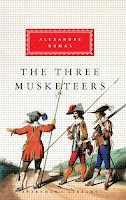★★★★☆
Four Things I Liked About The Three Musketeers:
1. D’Artagnan
2. Paris
3. The valets
4. Intrigue! Sword fighting! Plotting!
I generally try to start my reviews with a little bit of backstory, but in this case, there isn’t really any backstory to give. The Three Musketeers was one of those books that ended up on my “Obviously I’m going to read this” list rather by accident. It’s one of the Top 100, I liked Dumas’ The Count of Monte Cristo, and it’s fat – perfect for my summer of brick-thick books (previously: Atlas Shrugged, up next: War & Peace and East of Eden).
Considering what a fixture The Three Musketeers is in our working cultural knowledge, I’d wager that very few people are actually familiar with the story. For example, contrary to what you might assume from the title, The Three Musketeers stars one recklessly brave young man named d’Artagnan, who is in fact not a musketeer at all – at least not at the beginning. D’Artagnan comes to Paris with a letter of introduction from his father to M. de Tréville, captain of King Louis XIII’s musketeers, seeking to make a place for himself in the world. Having lost his letter in an altercation en route to Paris, the interview fails to install him as a musketeer, but does earn him a position as a guard, as well as facilitating his fateful first meeting with the three musketeers who become his most faithful friends: Athos, Porthos, and Aramis. D’Artagnan quickly adapts to city and military life, and in almost one fell swoop manages to fall in love and become embroiled in the rich political turmoil of the time, caught between the king, the queen, the cardinal (Richelieu), and the beautiful but deadly Lady de Winter.
The Three Musketeers is, more than anything else, a tale of adventure. But it is not just a tale of adventure. For us, it serves as authentic historical fiction, though it was not written as such at the time. It’s also part romance, part political portrait, and part 17th century chivalric code. But my favorite aspect, I think, was the characterization. As canned as the expression sounds, d’Artagnan really does jump off the page. He’s impulsive, passionate, loyal, and eager to prove himself. His friends Athos, Porthos, and Aramis are equally well developed; none of them are simply stock soldiers. Athos harbors a dark past, Porthos is a good-hearted hedonist who revels in good wine and good company, and Aramis continually professes that he “is only a musketeer temporarily” until he takes his monastic orders. The four friends also each have a personal valet, none of which fade into the background of the story but have their own distinct personalities and roles to play in the novel. That can be said of just about every character in The Three Musketeers. Even when someone only appears in a few scenes, and with minimal physical description, it is very easy to imagine them as a real character, in the dictionary definition sense of the word: “the combination of traits and qualities distinguishing the individual nature of a person or thing.”
Reading The Three Musketeers, it was easy to picture it as a movie, especially the summer blockbuster/family action flick variety of humor, romance, good-hearted bravado, and lots of sword-fighting fun. Of course, I’m not the first to have this impression – The Three Musketeers has been adapted to the silver screen any number of times, the most recent of which is coming out this fall. I’m not sure how high my hopes are, though, even though I think Logan Lerman – who I cast as Jacky Faber’s beau, Jaimy Fletcher, in an earlier post – makes a perfect d’Artagnan. I mean, there’s a clip of boat flying over the Louvre. How true an adaptation can it really be when there are flying boats involved? Also, it's in 3D. I like 3D about as much as I like Kindles.
Random fact: The novel takes place back when the Louvre was still a palace, and I constantly had to remind myself of that as I read. Nowadays, it’s really weird to think of the Louvre as anything but a museum, and stranger still to think of anyone actually living there.
Books Read This Year: 52
Top 100 Progress: 45/100


That's technically six things that you liked. Are you sure that's the right book? 'cause I had no idea.
ReplyDeleteGlad to see with your "currently reading" note that you are alternating serious with "beach reads" -- at least juding the book by it's cover!
ReplyDeleteOf course it's the right book. Do you mean you had no idea about the d'Artagnan thing?
ReplyDeleteYou judged right. I can't read classics full time... I need to take breaks from the heavy reading with some light reading, too, for pure fun! I usually alternate 2 to 3 fun books for each more demanding one.